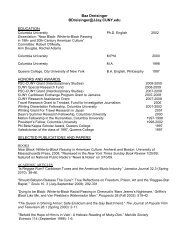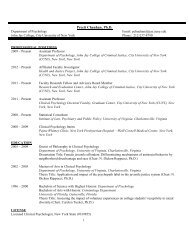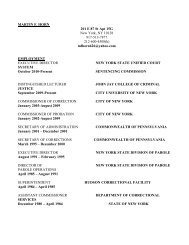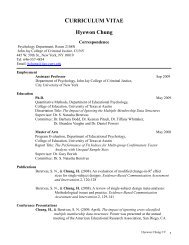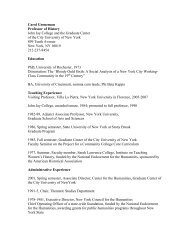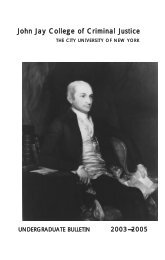Bulletin - John Jay College Of Criminal Justice - CUNY
Bulletin - John Jay College Of Criminal Justice - CUNY
Bulletin - John Jay College Of Criminal Justice - CUNY
You also want an ePaper? Increase the reach of your titles
YUMPU automatically turns print PDFs into web optimized ePapers that Google loves.
Certificates, Programs and Minors<br />
DISPUTE RESOLUTION MINOR (Department of<br />
Sociology)<br />
Description. The Dispute Resolution minor provides students with<br />
an opportunity to learn about the causes, complex dynamics,<br />
escalation, de-escalation, and constructive resolution of conflicts in a<br />
variety of contexts from the interpersonal to the international levels.<br />
Students will also gain knowledge and techniques necessary to<br />
negotiate, facilitate, and mediate a wide range of situations.<br />
Learning Objectives. Upon completion of the minor, the students<br />
will be able to:<br />
• Recognize the causes of conflict<br />
• Understand the dynamics and progression of conflict<br />
• Think more critically about how to process conflict situations,<br />
utilize dispute resolution techniques and skills needed to<br />
negotiate, facilitate, and mediate in a variety of contexts.<br />
Rationale. This minor is particularly attractive and beneficial for<br />
students who cannot complete the existing Dispute Resolution<br />
Certificate since they will acquire a solid understanding of conflict,<br />
its causes, progression, complexity, and management. With 18<br />
credits focused on dispute resolution, it is still possible for students to<br />
deepen their critical understanding of conflict which will be<br />
invaluable for them in their personal lives, at work, and in graduate<br />
school, especially for those students who will enter professions like<br />
law, social work, business, etc, where sorting through conflicts is<br />
essential. There is virtually no major that will not benefit from<br />
having students add this minor to their undergraduate portfolio.<br />
Minor coordinator. Professor Maria Volpe, Department of<br />
Sociology (212.237.8692, mvolpe@jjay.cuny.edu).<br />
Please note: Students cannot earn both the Minor and Certificate<br />
in Dispute Resolution.<br />
Requirements. Students wishing to minor in Dispute Resolution must<br />
complete 18 credits of coursework, of which 6 credits are required and<br />
12 credits are electives. Courses chosen for the minor have been selected<br />
to reflect substantive areas relevant for dispute resolution and to<br />
differentiate it from the Dispute Resolution Certificate.<br />
Credits<br />
Required Subtotal: 6<br />
Sociology 206 The Sociology of Conflict and Dispute Resolution<br />
Sociology 380 Sociology Laboratory in Dispute Resolution Skill<br />
Building<br />
Electives Subtotal: 12<br />
Select four<br />
African-American Studies <strong>Justice</strong> 229 Restorative <strong>Justice</strong>: Making<br />
Peace and Resolving Conflict<br />
African-American Studies Sociology 110 Race and the Urban<br />
Community<br />
Anthropology 330 American Cultural Pluralism and the Law<br />
Law 206 The American Judiciary<br />
Philosophy 302 Philosophical Issues of Rights<br />
Philosophy 310/Law 310 Ethics and the Law<br />
Police Science 245 Community Policing<br />
Psychology 202/Sociology 202 The Family: Change, Challenges and<br />
Crisis Intervention<br />
Psychology 213/Sociology 213 Race and Ethnic Relations<br />
Psychology 236 Group Dynamics<br />
Psychology 275 Family Conflict and the Family Court<br />
Sociology 236 Victimology<br />
Sociology 308 The Sociology of Violence<br />
Sociology 381 Internship in Dispute Resolution<br />
Interdisciplinary Studies Program (with permission of the minor<br />
advisor)<br />
ECONOMICS MINOR<br />
Total: 18<br />
Description. Economics courses provide students with an opportunity<br />
to develop critical analytical skills that will improve their performance<br />
in other courses and professional pursuits. These include<br />
understanding graphs and charts, employing statistical analysis, using<br />
cost-benefit analysis, evaluating different theoretical perspectives and<br />
developing professional presentation and writing skills.<br />
185



